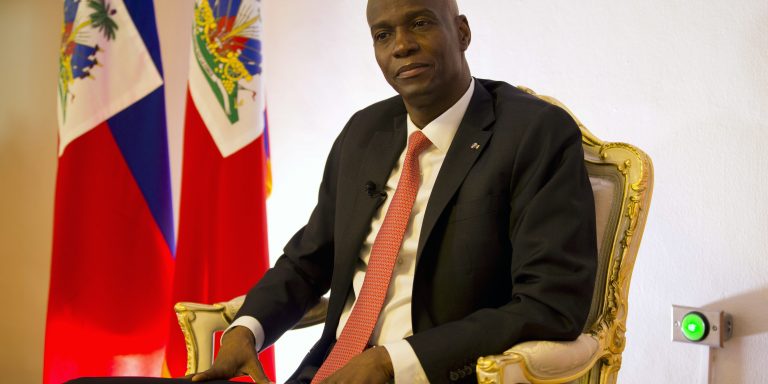INTELBRIEF
July 8, 2021
IntelBrief: Haiti’s President Jovenel Moïse Assassinated in Brazen Attack

Bottom Line Up Front
- Early yesterday morning, Haiti’s President Jovenel Moïse was assassinated by unidentified armed gunmen at his home outside of Port-au-Prince.
- In a country that has struggled with coups and dictatorships, many Haitians remain concerned about the backsliding of an already tenuous democracy.
- Corruption has long plagued Haiti, which remains among the poorest nations in the Western Hemisphere.
- With a population of eleven million people and a government often unable to provide basic services, criminal gangs have filled the power vacuum in Haiti.
In the early hours of July 7, Haiti’s President Jovenel Moïse was assassinated by unidentified armed gunmen at his home outside of Port-au-Prince, the Haitian capital. Moïse’s wife, Martine Moïse, was also shot in the attack and remains hospitalized. Senior government officials suggested in interviews that the assailants may have been foreign mercenaries. The brazen murder of a sitting head of state rocked the Caribbean nation, which is currently being led by Prime Minister Claude Joseph, who declared that the police and military would keep the situation from spiraling out of control. But some indications suggest otherwise, as Haiti has been engrossed by political instability. Joseph urged calm and suggested that the country was secure, while condemning the “odious, inhuman and barbaric act” and moved to declare a state of emergency after leading a cabinet meeting. By positioning himself as a critic of Venezuelan dictator Nicolás Maduro, who was nearly assassinated by explosives-laden drones in August 2018, Moïse was able to secure the backing of the United States under both the Trump and Biden administrations, respectively. The Biden administration described the attack as “tragic” and offered “to provide any assistance that’s needed.”
President Moïse’s government had faced widespread protests in recent years, with Haitians taking to the streets to demand his ousting, claiming that his term had expired. President Moïse had been ruling Haiti by decree for more than two years after failing to hold elections, using a contested interpretation of the Constitution to maintain power. The U.S. had accepted Moïse’s extended term but continued to urge the Haitian government to organize free and fair elections. Protests swelled throughout the country for three consecutive months in late 2019. Parliament was dissolved in January 2020 following the failure to hold elections. In February 2021, Moïse’s opponents declared Supreme Court Judge Joseph Mécène Jean-Louis to be Haiti’s interim president. On July 5, Moïse had tapped Dr. Ariel Henry, a neurosurgeon and former Haitian Minister of Interior, Labor, and Social Affairs, to be sworn in as the new prime minister this week, although his appointment was delayed.
Opposition activists have been demanding that Moïse step down, accusing him of a power grab following the passage of a law that limited the power of the judiciary, and another that created a new intelligence service directly reporting to Moïse. Pushback escalated throughout the first half of 2021—general elections are scheduled for later this year after being postponed twice, ostensibly due to the coronavirus pandemic, despite the country reportedly having one of the lowest death rates from COVID-19 in the world. In a country that has long struggled with military coups and dictatorships since gaining independence from France in 1804, uncertainty is rife, and many are concerned about the backsliding of an already tenuous democracy. Corruption has long plagued Haiti, which remains among the poorest nations in the Western Hemisphere and has never recovered from the devastating earthquake that rocked the country more than eleven years ago. Hurricane Matthew wreaked further havoc in 2016. More than sixty percent of the population makes less than $2 per day, and food and fuel prices have soared due to inflation. Food shortages have led to dire health conditions among Haiti’s population.
With a population of approximately eleven million people and a government often unable to provide basic services, criminal gangs have proliferated and filled the power vacuum. The United Nations Stabilisation Mission in Haiti (UNSTAMIH) (French: Mission des Nations Unies pour la stabilisation en Haïti), also known as MINUSTAH, was established to support Haiti after a rebellion toppled then-President Jean-Bertrand Aristide in 2004, and the nation was confronted with an upsurge in political and criminal violence. While the UN often plays a critical role on the ground providing a semblance of security and services when national governments and international partners are unable or unwilling to do so, MINUSTAH was also at the center of controversy regarding sexual exploitation and abuse by peacekeepers, and Haiti’s continuing instability raises questions about the long-term impact of the Mission. There have long been internal security challenges, with armed kidnapping gangs marauding throughout the country, exploiting the security situation for criminal profit. Thousands have been displaced as a result of the growing gang violence. Elements of Moïse’s government were accused by human rights activists of maintaining ties to some of the gangs. Following the assassination, there were some reports of looting, though it remains to be seen if the country will descend into further violence.